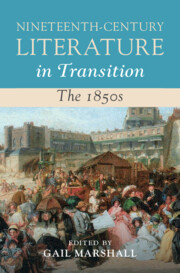Book contents
- Nineteenth-Century Literature in Transition: The 1850s
- Nineteenth-Century Literature in Transition
- Nineteenth-Century Literature in Transition: The 1850s
- Copyright page
- Contents
- Figures
- Contributors
- Acknowledgements
- Introduction
- Chapter 1 Pictures of Nature
- Chapter 2 ‘When I Came Back, It Was … to the Love of a New Generation’
- Chapter 3 George Eliot, the Westminster Circle, and Karl Ernst von Baer’s Embryological Germ Theory
- Chapter 4 The 1850s Sustainability Novel
- Chapter 5 Serialising London in ‘Twice Round the Clock’
- Chapter 6 Theatre in the 1850s
- Chapter 7 Beyond the Art of Conversation
- Chapter 8 Making Soldiers Count
- Chapter 9 Finding the Lost
- Chapter 10 British India in the 1850s
- Chapter 11 Christian Heroism
- Chapter 12 Horsepower in the Railway Age
- Chapter 13 Trauma, Gender, and Resistance
- Chapter 14 The Poetry of Married Life
- Chapter 15 George Eliot, Henry James, Realism, and Europe
- Index
Chapter 5 - Serialising London in ‘Twice Round the Clock’
Metropolitan Travel Writing at Mid-Century
Published online by Cambridge University Press: 02 January 2025
- Nineteenth-Century Literature in Transition: The 1850s
- Nineteenth-Century Literature in Transition
- Nineteenth-Century Literature in Transition: The 1850s
- Copyright page
- Contents
- Figures
- Contributors
- Acknowledgements
- Introduction
- Chapter 1 Pictures of Nature
- Chapter 2 ‘When I Came Back, It Was … to the Love of a New Generation’
- Chapter 3 George Eliot, the Westminster Circle, and Karl Ernst von Baer’s Embryological Germ Theory
- Chapter 4 The 1850s Sustainability Novel
- Chapter 5 Serialising London in ‘Twice Round the Clock’
- Chapter 6 Theatre in the 1850s
- Chapter 7 Beyond the Art of Conversation
- Chapter 8 Making Soldiers Count
- Chapter 9 Finding the Lost
- Chapter 10 British India in the 1850s
- Chapter 11 Christian Heroism
- Chapter 12 Horsepower in the Railway Age
- Chapter 13 Trauma, Gender, and Resistance
- Chapter 14 The Poetry of Married Life
- Chapter 15 George Eliot, Henry James, Realism, and Europe
- Index
Summary
Catherine Waters argues that the growth of London, and the proliferation of cheap periodicals, particularly after the repeal of the newspaper stamp tax in 1855, generated a new form of ‘metropolitan travel writing’ representing ‘the lived rhythms of urban experience that is a distinctive development in the print culture of the 1850s’. Dickens’s Household Words, launched in 1850, published graphic sketches of city life that provided readers with a vivid experience of imaginary flânerie. This chapter is concerned with George Augustus Sala, a protégé of Dickens, whose 1858 serialised account of a day in London for The Welcome Guest – ‘Twice Round the Clock’ – deploys its serial form to map the temporal geography of the metropolis with an appealing blend of reporting and storytelling.
- Type
- Chapter
- Information
- Nineteenth-Century Literature in Transition: The 1850s , pp. 113 - 135Publisher: Cambridge University PressPrint publication year: 2025

